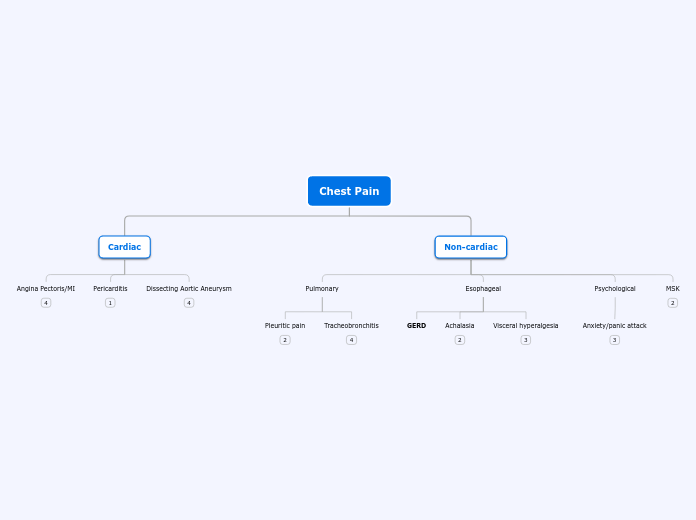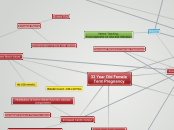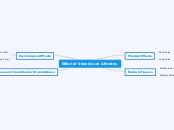Chest Pain
Non-cardiac
MSK
Pain may be reproducible on physical exam
No burning in esophagus
Psychological
Anxiety/panic attack
Also associated with breathlessness, palpitations, weakness, and anxiety
Aggravated by emotional stress
Stabbing, sticking, or dull and aching pain located precordial, below left breast, or across anterior chest
Esophageal
Visceral hyperalgesia
Also associated with constipation, bloating, diarrhea, and nausea/vomiting
Not normally associated with eating or lying down
Pain presentation ranges from sharp to dull or burning and may be constant or relapsing
Achalasia
Food is coming from esophagus, not stomach
Associated with dysphagia, regurgitation of food and liquids, coughing at night, and chest pain that comes and goes
GERD
Pulmonary
Tracheobronchitis
Associated with a cough
May be relieved by lying on affected side
Made worse by coughing, not food or lying down
Burning pain located upper sternal or on either side of sternum
Pleuritic pain
Persistent pain aggravated by deep inspiration, coughing, and movements of the trunk
Sharp, knife-like pain located on chest wall
Cardiac
Dissecting Aortic Aneurysm
Also associated with hoarseness, dysphagia, syncope, hemiplegia, and paraplegia
Aggravated by hypertension, not food or lying down
Would be an abrupt onset, early peak, and persist for hours or more
Ripping, tearing pain located on anterior chest and radiating to neck, back, or abdomen
Pericarditis
Sharp, knife-like or crushing pain located retrosternal or left precordial and may radiate to tip of left
Angina Pectoris/MI
Sometimes associated with dyspnea, nausea, sweating, weakness
Not persistent and at the same time (each night, after each meal)
Not normally associated with eating meals, beer, coffee, or lying down
Pressing or squeezing pain (not usually burning) located retrosternal or across anterior chest and sometimes radiating to shoulders, arms, neck, lower jaw, or upper abdomen









